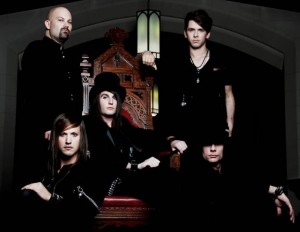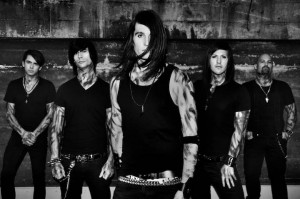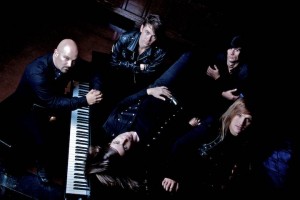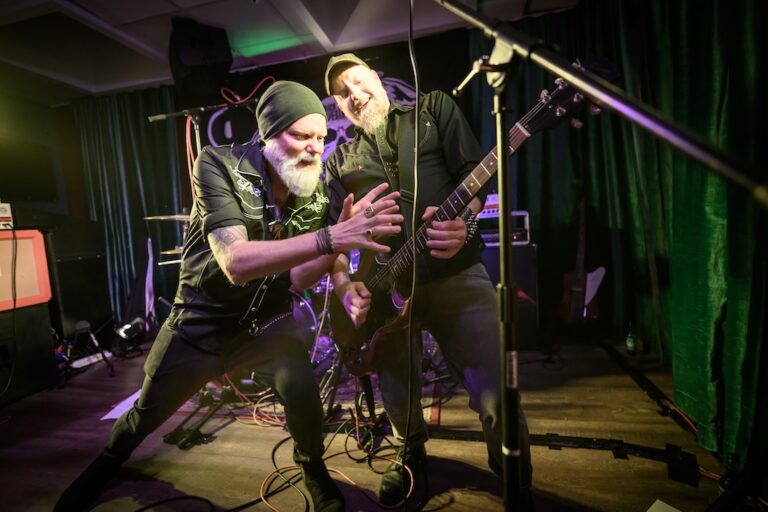Canadian act Incura are a spectacularly unique band who blend myriad influences into something new, unique and exciting. The band released their debut album in Canada last year and it is now being released in the UK (thus avoiding hefty import prices) by progressive rock specialists InsideOut. When speaking to the band’s vocalist Kyle Gruninger, the first impression you get is that Kyle is both friendly and charming, but over the interview what becomes even more readily apparent is the fierce passion that lies blazing underneath Kyle’s seemingly placid exterior. When posed a question Kyle takes his time and gives thoughtful, lengthy replies, always highlighting his deep love of music and theatre and, in particular, of Incura, a band which he speaks about with the deep love and respect of a father about his new-born child. With the album hitting the racks tomorrow, we were proud to be able to have a chance to discuss the influences and inspiration that led to its creation, read on and discover Incura…

One of the things about the music of Incura is that it’s so varied and has so many different influences and I was wondering if that can make it difficult for you to find your audience?
That actually has become… and don’t get me wrong, it’s not what we set out to do, we just set out to create a record and music that we really liked and that we felt really comfortable playing and that challenged us, right? But, in doing that we created Incura! So what happens is, like you said, we’ll get on a pop festival, but we’re not a pop band and then we’ll get on a metal festival and we’re not a metal band. But the great thing about Incura is the musicianship and I’m very fortunate to have musicians on my team that are elite and I think are just amazing. So whether you like Katie Perry or whether you like Cannibal Corpse, you may not like Incura – it may not be your bag – but you’ll always respect what you’re watching. You may listen to a song and say “Not my cup of tea, but I respect it, I’m OK with it.” We’re not looking to get everybody. I know some people are not going to like us and that’s OK, I don’t want everybody to like us! But, as far as it goes, yeah, it is difficult to find an audience. And I think one of the reasons we shifted a lot of our operations over to the UK and to Europe is just because, we feel… and because we’ve been there a few times… that that market speaks highly of us and we speak highly of people being into the musicianship and the creative part of being in Incura.
The way that you present yourself and the varied style must take a lot of self-belief. Was it difficult for you to find the musicians who make up Incura.
Hmmm.. I wish I could say it was difficult but my musicians and I – we’ve basically grown up together, which is kind of awesome! So we always knew what we wanted out of this. I wouldn’t say it was scary or anything being so individual or different sounding. It was actually rather exhilarating and thrilling, kind of a driving process where people were saying “you don’t sound like anybody – I’ve never heard anything like this before.” And, well that’s scary to some degree, but also we decided to keep going and keep pushing if that was how it was going to be. And the musicians are fans of bands like Yes, Genesis, Rush – highly intense progressive bands – King Crimson and we’re OK with being who we are, we really, really are.
With some bands you get the impression that the songs are written in that old school, punk way, written on an acoustic guitar and then fleshed out by the band; but with you it sounds like the songs were carefully built up in layers – is that a fair observation?
Different songs range different emotions and take different formulas to create I would say. We do, of course, because we’re a prog rock band, we love to jam. Everyone loves to get together and just rock out so of course tons of the record came from a lot of jamming, a lot of feelings, stuff like that. Now I have a very high respect for song writing. I think song-writing is an extremely difficult process and I think it’s an extremely difficult thing to achieve well. And being in a prog rock band, we really didn’t want the whole “look at me” factor. I go to see bands all the time who forget about their audience and just make these seven minute guitar epics that they are happy with and they feel comfortable with. But there’s no song. There’s nothing there that, as a listener who doesn’t play guitar and doesn’t know that the snare hits on four and the bass drum hits on two and… you know what I mean. I wanted a song. I want songs for those people. So, if you take any Incura song, you can play it on acoustic guitar and that was one of my main focuses of this record. Songs are very important to us, but walking the fine line of being instrumentalists and very musical, theatrical prog rock band with pop sensibilities, or at least a splash of pop on there, it’s a difficult line to walk and hopefully we’ve achieved it. So, of course, jamming and putting all those little bits together, it all kind of works like that, but there is a very big focus on the song as well.

One of the things that struck me was that , with the exception of Peter Gabriel perhaps, I can’t think of another band who have presented themselves in a way that cuts so close to the sound of musical theatre – there must have been a strong influence there?
Well of course – let me tell you the secret of where it all comes from! I studied, as part of my degree at university, live theatre performance for a long time. I also sing, dance and act in a professional theatre company in Canada as well, so I have had a love for theatre for pretty much my whole life. I went to see Phantom of the Opera at five and that pretty much started me on music. Seeing the intense emotion and the dark, dark tragedy and all these people are watching and I’d never felt anything like that at five. You listen to a violin and it evokes an emotion in you – I never had that and I wanted to try and create that feeling. So the theatre piece of me actually comes from that – Andrew Loyd Webber and just performing. I’m a performer, I really am.
It strikes me that there’s a difference between writing lyrics for rock music which can be more vague and abstract, and musical theatre where you have to embody a role – do you focus more on presenting a character and a role or do you write more in a rock style?
The great thing about Incura, because I’ve done it for so long and because it is my baby, the lyrics and all the characters that are Incura are me and pieces of my life, in my past, or maybe in my future that I’ve seen r created or I’ve been a part of. I write my lyrics all the time so it’s not like I hear a song and have to go and write six lines or whatever right away. I have books and books of words and lyrics and everything comes from a direct personal experience. My lyrics are very close to me and they speak the truth of my life and the things I’ve done and gone for. I have never written lyrics for any other band that isn’t Incura, really, well here and there I guess, but I don’t know what it’s like to write a pop song or rock song or what I’m doing wrong! I write and it comes out as Incura so hopefully it sticks to that!
So if you have these books of lyrics, do they then need to be taken and shaped to the melodies that you’re working on?
Well, it depends. It’s always different depending upon what it is. Sometimes the melody comes from the lyrics and the writing process is different for every single song and as you grow as a person or song writer things change – but on this record there would be a guitar riff and I would have lyrics and I’d just kind of read the lyrics over the riff and find where the punch and the detour is and then really come up with it right there. And you’re right, sometimes there’d be a melody – maybe some sort of melody idea in a piano part and then I’d just jump in with some words and make it sound good. It’s always different and that’s the great thing about being in a progressive rock band, there’s no right or wrong way to do anything – we just do it and if it comes out good then good!

One of the cool things about making music in this age is that the ability to produce something listenable at home, without need for a studio or label, is there : did you take the opportunity to develop songs at home or was everything done on the fly in the studio?
We’ve been a band for a very long time and, the great quote I always love to say is that you’ve had your whole life to write your first record and six months to write the second one. For us, a lot of this record we’ve been jamming on for years, I’d say probably, out of the ten songs on the record, three of them are at least five years old. So we did work a lot on this record and the home recording – we did a little. We always demo all of our stuff and that’s great, but we do have EPs that we put out as well, independently in Canada, things like that. But really, it comes together in the studio, the very last shine in the studio. But because we don’t have big budgets, I don’t have $250 000 to make a record, I really don’t, so studio time is money so we try to have everything done in pre-production so the studio is quick. It’s not… but we try. If you have all the songs done and all the parts there… usually everything is pretty done musically and song writing and everything and usually the studio’s like the icing on everything. The worst is going into a studio with an acoustic guitar and adding everything else once you’re there. You can feel the lack of emotion whereas I’m really a fan of realness and truth in music. There’s no auto tune, there’s no flying pieces. Every single word is different so yeah it’s very intensive.
The perception over here is that progressive music is largely more popular over here in Europe – is that fair?
Yes, it is fair. Progressive music, although it is here, it’s more difficult, because it doesn’t sell many records although maybe that’s not the goal of progressive rock, but it doesn’t sell as many records as pop music, so it’s hard to tour your project (actually I’m talking Canada rather than the US), it’s hard to tour due to weather reasons. The touring season here is only about five months, the major cities are like twelve to fifteen hours apart or more, and you have only about three cities with over a million people in them. So you can only get to a certain point here unless you’re willing to invest in radio marketing, ad marketing and things like that, but most bands don’t have money for that sort of thing so tend to focus on touring. If you can afford it and get some help, I think that the UK, I think that Europe… 100% has more support for prog rock and metal and rock than here… 100%. We played Germany last year and seeing the attendance, the people coming to festivals and not just for one band but coming for the festival blew my mind. Bands that I loved from when I was a kid – bands like Soulfly… you know, when I saw Soulfly in Canada they were playing to 300 people in a small club, whereas in France they were playing for 10,000 at Hellfest. It’s kind of different!
You mention touring – how difficult is it to work your recorded pieces into your touring set?
Because we worked on this record for so long and so hard – this record took my soul away! It has, it’s now in that recording! Reproducing it live really wasn’t that difficult. It was time consuming to the degree that we had to make sure it was all there. And rthere are certain things on the record, like an ambient sound in the background, we’re not going to throw that in there. But it was already done. Like Guitar parts, we’d already worked on guitar parts for two fucking months, so the hardest part was just getting it all together and jamming. It took as a couple of times when we got together in the rehearsal space – we had to run the son of a bitch like twenty times. Speaking for me, you know I’m a singer so it might be easier because the vocal parts are there. If you’re the piano player on the other hand and you’re playing piano parts with one hand and violin or cello parts with the other, it might take him a little longer!
I think in some ways for a singer it is hard though because when a string breaks you replace it but for a singer, especially as you have a very wide range, when something goes wrong it’s really tough. Do you have any special routines for caring for your voice?
Right – now you’re exactly right when it comes to being on the road. If you’re a guitar player you can be throwing up sick and your instrument is still going to sound fine but for me… yeah it’s very different that way. Touring, I take care of my voice probably how you should and better than most. I don’t smoke, I don’t drink at all on tour when I have shows the next day. I sleep every night. I get time off from driving because I sing. My voice is delicate for sure, so I warm up before every single show, not just my voice but my whole body. I learnt that, not form doing this, but from voice lessons at university and your voice is connected through your entire body: if your hamstrings are tight you’re not going to be able to hit the notes you want. It sounds strange but it’s totally true, so I warm up extensively (and so does the whole band) before shows and I warm up my voice just physically as well. Also your diet – I drink litres of water a day, plus throat coat: a mixture of sage and so on. I take it very seriously and I have to, because I want to give people the show they deserve: they’ve paid money to see me, and if they don’t believe I can do it then I have to show them and then impress them on top of that!
That must lead to a lot of pressure on you because if anything does go wrong then it’s all on you!
That’s right and that’s the adrenalin and you can’t buy that! That’s why I love live theatre, that’s why I love that stuff, because at any time the whole thing can blow up in your face and that adrenalin… that feeling, when you’re in front of a few thousand people and you’re wondering if you can do it – you can’t buy that high! I love that pressure, that’s my job, it’s better than the pressure of having to get my reports into my boss every six weeks!!! There’s worse pressure. It’s better than the pressure to feed my child because I don’t have a job, or I can’t pay my house rent – I don’t care! My pressure is to sing and… bring it on! I’m ok with that.
When I listen to you, you remind me of interviews with Freddie Mercury who used to talk about his love of singing and the intense warm ups he used to do. Who are your vocal heroes?
Now, some of the vocal heroes you can’t actually hear in the recording, like a lot of influences, maybe more influences than you can hear in Incura. But, of course, like you said, Freddie Mercury is a giant influence of mine. More in the fact that in song writing he was writing complete rock, and then on the other side progressive rock, and then on the other side and opera and on the other side, dark, gritty rock, so that’s really where Freddie gets me. And, of course, singers like Maynard James Keenan from Tool played a big influence on me, Peter Gabriel, maybe even King Crimson. There are a lot of singers. Maybe when you go back even further, to when I was younger, people like Corey Taylor from Slipknot, Jon Davis from Korn – they were big influences as well. Any singer that brings extreme emotions and extreme feeling, I always call it theatre of the mind, is someone that I look up to. If I can have you as a listener sit in a chair and, without seeing me, I can make you feel and show you the emotion I’m going through, but sonically, I really admire singers who can accomplish that. Even though I don’t listen to them anymore, when I was thirteen I remember listening to ‘life is peachy’ by Korn, who Ross Robinson produced, and some of that shit was really heavy for a thirteen year old. And the voice just projected extreme emotion – crying, screaming, ripping mics down, and that is what I want to hear, I want to hear, I want to hear passion and that’s what I want to perform as well.
Was it difficult to spread the word of Incura internationally and how did you achieve that?
The great thing, well good and bad, social networking helps to do that, but the terrible thing about music today is that there are so many bands and so much music that there’s no filtering system anymore. If I said to random people “hey check out my band!” they don’t care! There needs to be a reason people want to hear your band. There needs to be a want, you can’t just say “I’m in a band, listen to me,” anymore and we know that live is how we do that. Incura live is what really attracts our fans. We toured with a band called Apocalyptica for a while and all of a sudden we went from a few hundred fans in this city to tripling that, just from playing with another band and heading out to tour there. We went to Germany last year and toured around for a bit and all of a sudden we started getting interest there, more than we were getting in our home town, so it’s touring. And of course social networking helps too and there’s management and label and stuff like that. But to meet all those people and do all those things came from Incura touring relentlessly and playing live and, in doing that, having people who have seen that, or seen some of the recording process, or seen us jamming; telling a friend and the best recommendation for any project is a personal recommendation – if you have a friend who comes up to you and says “oh my god! This is the greatest band I’ve ever seen, you need to go and see them tomorrow!” you’re probably going to take that recommendation and go see them. If you’re walking by a poster on the way to your morning coffee, you’re not likely to go see that band you’ve never heard of, so we really think word of mouth. It’s hard, but we’re ok with that. We’re going to tour and we’re not the biggest band in the world right now, but as long as people keep seeing us and we keep touring, we’re always going to grow our fan base. The music and the show – I’ve put a lot in to and I think people will feel that when they listen to the record or see the show , so passion will really bring fans to us, I hope.
With that in mind, when are we going to see you in the UK?
OK, now, Can I tell press this? I had phone calls this morning saying April. But it may be different because two weeks ago it was May! Honestly – I got tour dates yesterday, so we will be there and we’re focusing on shipping all of our work and progress over to Europe and over to the UK, just see how it goes and we’ll spend our money in your countries instead, maybe it’ll be easier!
Any final words?
I believe in quality over quantity. I’m not looking to put out records every year, I’m not looking to put out a bunch of shit people buy. I’m going to make epic, beautiful pieces that I can be proud of. I’m going to tour like mad and tour all these songs and really push this record and bring it to you and as many fans and people as I can and then in a few years put something else out. My final words are do what you love, not what you’re told!




great interview and fantastic to read kyles in depth answers..well thought thru..I’ve only recently june 2016, being exposed to incura after meeting kyle performing in another band #bandofshipsies on a cruise!
his lyricism performability and sheer joy in letting it all out to a rapturous and happy audience was mesmirizing to witness..
you just had to ask “what’s he doing here!” now I get it as a dedicated artist kyle explores all stimuli..love his music!
Hi Lucette, Many thanks for the comment – we’re really glad you enjoyed the interview and we agree, Incura are a fantastic band and we can’t wait to hear more from them!